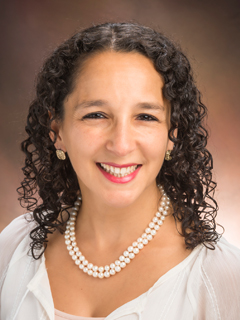HOW CAN WE HELP YOU? Call 1-800-TRY-CHOP
In This Section
Philadelphia Marathon, Adolescent Mental Health, C. difficile, Natural Language Processing, High-Risk Neuroblastoma

Although the work week was shortened due to Thanksgiving festivities, we're never short on Children's Hospital of Philadelphia researchers in the news. In today's research roundup, check out which CHOP postdoc won the Philadelphia Marathon women's race! Learn how adolescent mental health was affected by financial stress caused by the COVID-19 pandemic, how antibiotic-resistant microbes in the gut can make C. difficile more infectious, and how liquid biopsies can catch disease progression early in high-risk neuroblastoma. And don't miss which lab tied for first place in a national machine-learning natural language processing challenge.
Amber Zimmerman, PhD, Wins Philadelphia Marathon

Amber Zimmerman, PhD, wins the Philadelphia Marathon. Photo credit: Karen Mitchell, Runner’s Gazette
Congratulations go out to our own Amber Zimmerman, PhD, the fastest woman in this year's Philadelphia Marathon. Dr. Zimmerman won the women's race on a frigid day — the coldest running of the marathon since 1994, when it became a City of Philadelphia-managed race held strictly within city limits. A new personal best, she completed the race in 2:31:35. As a first-place finisher, Dr. Zimmerman took home $10,000, plus an extra $1,000 because she lives in Philadelphia.
"I mostly use running to cope with stress from work and life," Dr. Zimmerman said. "I just started running a lot of miles before work every day to help me stay focused. I'm one of those people that likes to go full throttle on everything I do, so as my workload increased, so did my running."
Dr. Zimmerman is a postdoctoral fellow mentored by Struan Grant, PhD, in the Division of Human Genetics at CHOP and by Allan Pack, PhD, in the Division of Sleep Medicine at the University of Pennsylvania.
"It's been a great environment since I came to Philadelphia in 2021," she said. "My mentors are incredibly supportive in my career and have provided a lot of opportunities for me. I'm lucky to get to do a job that I love and race against great competition all in one city."
Taking her running to another level, Dr. Zimmerman will head to Orlando, Florida in January 2024 for the Olympic Team Trials, the selection race for the Paris 2024 Olympic Games Marathon. To make the Olympic team, a participant must run under 2:28, and place in the top three.
"In the United States right now, I am ranked 21st in the women's marathon. I would like to try to finish in the top 10 at the Olympic Trials," she said. "Actually, I would like to finish in the top three and make the Olympic team. I'll give it my best shot!"
Learn more in the Philadelphia Inquirer or Runner's Gazette.
Adolescent Mental Health Affected by Financial Strain of COVID-19

Ran Barzilay, MD, PhD
Researchers at CHOP found that financial stress due to the COVID-19 pandemic took a distinct toll on adolescent mental health and contributed to depressive symptoms. While the effect affected all income groups who experienced financial strain due to loss of income, it was most pronounced in low-income adolescents. The study findings appeared in Lancet Regional Health – Americas.
"People often think children do not feel or understand financial stress, but this study shows not only that they do, but that this stress also takes a toll on their mental health," said senior author Ran Barzilay, MD, PhD, child psychiatrist and an assistant professor at the Lifespan Brain Institute, a collaboration between CHOP and the Perelman School of Medicine at the University of Pennsylvania that bridges the gap between pediatric and adult research. "Given the strain inflation is likely placing on families' finances, our findings underscore that financial stress is a key risk factor for adolescent mental health during economic crises and that addressing this stress is important given the current global youth mental health crisis."
Learn more about the study in CHOP News.
Study Shows Antibiotic-Resistant Microbes in Gut Make C. difficile More Infectious

Joseph Zackular, PhD
The human gut is filled with trillions of microbes, and these microbes influence the virulence of various pathogens but, until now, scientists had little understanding of how Clostridioides difficile, a bacterium that causes severe intestinal illness, cooperates with the rich collection of microorganisms in the gastrointestinal tract.
In study results published in Nature, researchers at CHOP showed that Enterococcus — an antibiotic-resistant, opportunistic pathogen — works together with C. difficile, reshaping and enhancing the metabolic environment in the gut so that C. difficile can thrive.
"When we talk about bacterial infections, we often just think of the pathogen itself, but the 'bystanders' in the gut can have a huge impact on the course of infection," said senior author Joseph Zackular, PhD, CHOP investigator and assistant professor of Pathology and Laboratory Medicine. "This study reveals that the coincidence of two pathogenic organisms — Enterococcus and C. difficile — is more than a coincidence; they truly take advantage of each other. Understanding this relationship, as well as other factors that contribute to clinical outcomes of C. difficile infection, is essential for combating this urgent public health challenge."
CHOP Team Ties for First in Machine-Learning Natural Language Processing Challenge
The Tsui Lab, affiliated with the Department of Biomedical and Health Information, competed with research teams from the United States and Europe to develop machine learning systems for identifying social determinants of health in clinical notes. Social determinants such as substance use, living situation, employment, education, racism, geography, and pollution, are at least as influential upon a person's health as clinical care, but health records do not usually encode these factors consistently, instead leaving them to highly variable statements in free text.
Natural Language Processing (NLP) systems, which give computers the ability to understand text and spoken words in much the same way human beings can, are capable of extracting mentions of social determinants, but are dependent upon massive amounts of training data. The National NLP Clinical Challenges (n2c2) shared task competition, organized by Harvard Medical School and George Mason University, challenged teams to develop improved methods of extending NLP systems, trained on smaller datasets, onto unseen data.
In the final scoring of the learning transfer task, the Tsui team's system's performance was statistically indistinguishable from the winning system from Microsoft Research. The Tsui Lab research will lead to NLP systems that are potentially more applicable to wider ranges of text, improving the ability of providers to access information to improve the care of their patients.
"This n2c2 work demonstrates my lab's commitment to using machine learning techniques for applying social determinant information to a wide range of health conditions, reducing mortality and costs," said Rich Tsui, PhD, associate professor of Anesthesiology and Critical Care Medicine, and director of the Tsui Lab at CHOP.
Research Shows Liquid Biopsies Catch Disease Progression Early in High-risk Neuroblastoma

Yael Mossé, MD
Patients with solid tumors like neuroblastoma — an aggressive pediatric cancer that accounts for up to 10% of childhood cancer deaths — often have tumor cells and tumor DNA circulating in their blood. Recent technological advances have allowed scientists to characterize this circulating tumor DNA (ctDNA). Working with the knowledge that identifying tumor changes early is key to successful treatment, CHOP researchers explored whether ctDNA profiling could be clinically useful in neuroblastoma.
The research team partnered with Foundation Medicine in examining the blood from 48 patients with high-risk neuroblastoma to investigate whether a series of "liquid biopsies" could less invasively and more accurately identify tumor changes in patients with high-risk neuroblastoma than tumor biopsies. The series of liquid biopsies revealed that some patients' tumors mutated under the pressure of treatment, which not only correlated with disease progression, but also made them potentially eligible for other targeted therapies. The study results, published in Cancer Discovery, also showed that ctDNA profiling can identify clinically relevant genomic evolution in tumors, perhaps even earlier than current standard disease surveillance methods.
"In time, ctDNA profiling could allow for decreased use of standard radiographic methods used for disease surveillance, many of which require analgesia along with continued exposure to radiation for children who are already at high risk for development of secondary malignancies," said senior author Yael Mossé, MD, co-leader of the Genes, Genomics, and Pediatric Disease Research Affinity Group. "We have developed a pediatric-specific liquid biopsy assay that is now being commercialized so that it can be available for all children with high-risk solid tumors and eventually become part of the standard of care."
ICYMI
Catch up on our headlines from our Nov. 11 In the News:
- Dr. Susan Furth Named Metro Philadelphia Healthcare Power Player
- CHOP's Clinical Vector Core is an ARRA Program Success Story
- Researchers Create First Viable Preclinical Model for Rare Mitochondrial Disorder
- Researchers Provide Proof of Concept for Treating Brain Tumors with Immunotherapy
Keep up with our news, stories, and updates in real time by following us on Twitter, Facebook, LinkedIn, or Instagram. Meet the minds behind the science in the Bench to Bedside podcast. Or subscribe to our biweekly newsletter, Research Insider, by signing up here.



